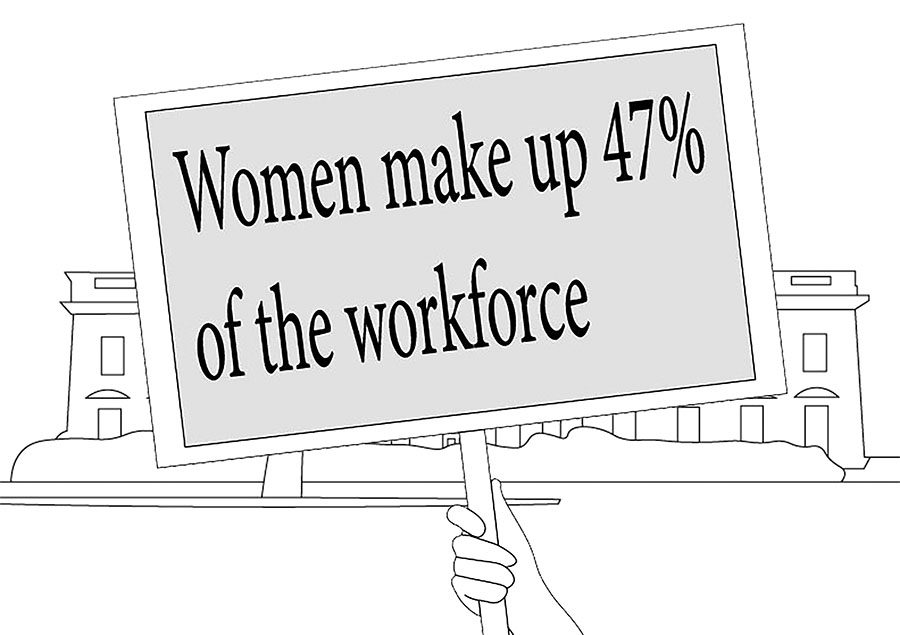We need to take diversity in activism seriously
This is a primary example of a sign that can be used instead of one that states ‘my uterus my choice.’ In theory, if a Day Without Women was executed properly. 47% of the workforce would be missing, an action that could severely impact people’s everyday lives.
April 24, 2017
In the past few months there have been endless efforts to recognize women’s importance in society, but how many of those protests have had women of color at the forefront of their movements? Trans-women? Women who have disabilities? Non-binary peoples? The lack of representation, diversity and inclusion, is enough. It’s time to start taking diversity in activism seriously.
On January 21st, women from all over the nation organized a march in response to Trump’s inauguration. According to the Women’s March on Washington’s website, these movements are urgent responses to current events. “The rhetoric of the past election cycle has insulted, demonized, and threatened many of us – immigrants of all statuses, Muslims and those of diverse religious faiths, people who identify as LGBTQIA, Native people, Black and Brown people, people with disabilities, survivors of sexual assault – and our communities are hurting and scared. We are confronted with the question of how to move forward in the face of national and international concern and fear.”
Wednesday, March 8th was the latest protest organized to recognize women in our everyday lives and the importance they carry. International women’s day was used to emphasize what people’s lives would be like without women’s physical, emotional, and mental labor.
But this begs the question, what about women who can’t afford to take the day off? What about mothers who are struggling to support their families and need the income that would come from a day’s work? Unfortunately those women are not always included in these marches.
Among the organizers of these marches is Linda Sarsour, a Palestinian-American woman. In response to the critique of the Day Without Women movement, Sarsour argues that every social movement has to have sacrifices to be effective. However, the working class, a social group already facing oppression, should not be the ones making sacrifices in the name of feminism. The success of social movements for equality should not hinge on the sacrifices of working class women.
Not everyone can afford to take the day off of work, there are single mothers who can’t afford daycare, or nannies and cannot ignore their responsibilities as mothers for a protest. Sarsour has recognized this, but feels there are multiple ways to show your support.
Physically attending protests on International women’s day was not the only way to participate. For those who couldn’t attend, wearing red to support the event, and abstaining from spending money on nonessential items were additional ways to take part in the events.
The issue with Sarsours’ solution is middle class women are still clearly the focus of the movement, they are the ones who can take off work, or frequently purchase non essential items. Far too often when we speak of women’s movement’s, we envision a cisgender, able bodied, straight, middle class, white woman holding a sign that reads “my uterus, my choice!” However, those signs and the accompanying mentality can quickly become exclusionary.
This is the very reason why Patty Cichantec, a South junior, has opted out of both a Day Without Women on March 8th, and the national Women’s March on January 21st.
She feels that while modern women’s movements are still necessary, most women’s movements have been exclusive of trans-women, non-binary peoples and women of color. “They’re very cis focused. It’s a lot of posters like “no uterus, no opinion,’ like I can understand in abortion settings, but outside of that, it’s very exclusionary of other women.”
Cichantec also observed the tendency to focus on white feminism during these marches. She defines white feminism as: “Being very exclusionary, and being like ‘women are people who have vaginas, and get their period every month and can have babies, and it’s just those types of women.” In reality, not every woman gets her period every month, or can have children but that doesn’t make her any less of a woman.
However, Cichantec and Sarsour have some common ground, they both see immense value behind modern women’s movements. In an interview with Amy Goodman and Democracy Now, Sarsour stated that she believes these movements are vital to various marginalized communities, “ I mean, this is an opportunity for us to say we will protect the most marginalized among us. We are going to stand up to fascism, and racism and xenophobia,” she commented.
If we are to do anything in the name of feminism and women’s rights it should be incorporating intersectionality into our work. Intersectionality is the process of viewing various oppressions as interconnected, and not separate. It is vital to use intersectionality in our activism in order to adapt to current events and political climates. This is not to minimize Sarsours’ important work in activism, but like Cichantec, I believe that the women’s movement have room for improvement and more inclusion.





